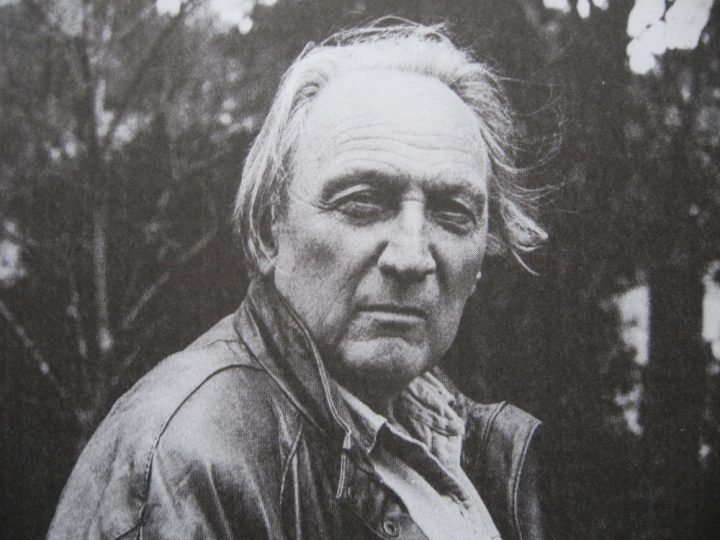“And then we’ll lose our marbles. There’s a pub at the end of the world, but in the middle of this life. And we think it’s best to take a gun and shoot them all. Maybe we’re surrounded by traitors to the true, real, honest life.” (S. Machonin: Excerpt from the review of the first version of the literary script of the film Courage for Every Day)
On the occasion of the world première of the digitally restored film Courage for Every Day (Každý den odvahu, 1964) at this year’s Karlovy Vary Film Festival, we commemorate Sergej Machonin. He first entered the Czechoslovak film scene in 1948 as one of the young film writers under the guidance of Jiří Hájek and Roman Hlaváč (having been under the influence of his experiences in the Sachsenhausen concentration camp, he was still working in the spirit of active socialism typical for the era after the 1948 Czechoslovak coup d’état).[1] In the 1960s, he then made a significant contribution to the “ferment-like process in art and other intellectual disciplines” as a translator from several languages, editor, writer, critic and script editor.[2] This contribution was based not only on his debates with the circle of people he considered kindred spirits, but above all on his work in Literární noviny (Literary Newspaper), both on his own texts and on the works of other authors he was able to concentrate around the then influential newspaper.
All the films Sergej Machonin worked on at the Barrandov Film Studio in the second half of the 1960s were made by the creative group Ladislav Novotný – Bedřich Kubala. Devoted to existential narratives at the time, the group had a permanent base of co-creators which included Antonín Máša, Evald Schorm, and Jan Čuřík.[3] As the script-editing practice became much more individualised at the Barrandov Film Studio after 1962, the creative groups gained greater autonomy.[4] Films were often results of an intense collective dialogue between artists and intellectuals who thought alike. Machonin’s name is specifically mentioned only in the later films of the creative group: as the script editor in Searching (Bloudění, 1965); as the co-writer in The Return of the Prodigal Son (Návrat ztraceného syna, 1966); and, again, as the script editor in Hotel for Strangers (Hotel pro cizince, 1966), The Girl with Three Camels (Dívka s třemi velbloudy, 1967), and I Killed Einstein, Gentlemen! (Zabil jsem Einsteina, pánové…, 1969). It is very likely, though, that he entered into a dialogue with the cast and crew of Courage for Every Day earlier. (At least in 1961 – as a theatre critic, Sergej Machonin regularly reviewed plays directed by Jan Kačer at the Petr Bezruč Theatre in Ostrava.[5] Kačer later starred in Máša and Čuřík’s Searching and, together with Jana Brejchová, also in The Return of the Prodigal Son and Courage for Every Day.)
It is hard to guess to what extent Schorm’s 1964 film was inspired by Machonin’s reflections on the system. However, we do know that Machonin reviewed the first version of the literary script for Courage for Every Day. His text is very expressive, with some parts close to a manifesto; Máša’s script serves the reviewer as a base for his own reflections: For example, he did not refrain from criticizing “the distorted life we live that masquerades as socialism”. Machonin’s statements here are still made “from within the system of power, but with a declared will to break out of it.”[6]
Notes:
[1] With hindsight, Sergej Machonin assessed the era after the 1948 Czechoslovak coup d’état as follows: “Today – and in fact for almost half a century now – I feel my alternative of ‘building socialism,’ so mindlessly chosen after the war and the concentration camp, as a neuralgic point, a sore stretch, a several-year-long spasmodic zone of life, which, as everything else in my curriculum shows, has its justifications. But as it turned out, all these good reasons didn’t stand the test.” In: Sergej Machonin, Příběh se závorkami (Alternativy), Brno: Atlantis 1995, p. 186.
[2] Ibid, p. 226.
[3] The creative group Ladislav Novotný – Bedřich Kubala moved to the Barrandov Film Studio from Czechoslovak Army Film in 1956. According to their agreement with the Czechoslovak Army Film, they had to make an army-themed film once a year, but in the 1960s they abandoned the army themes and emerged in the New Wave subjects. In: Petr Szczepanik, Továrna Barrandov: Svět filmařů a politická moc, Praha: Národní filmový archiv 2016, p. 102.
[4] Ibid, p. 286.
[5] Tereza Pokorná, Barbora Topolová (eds.), Sergej Machonin – Šance divadla. Praha: Divadelní ústav 2006, p. 432–443.
[6] Sergej Machonin, c. d., p. 229–230.

